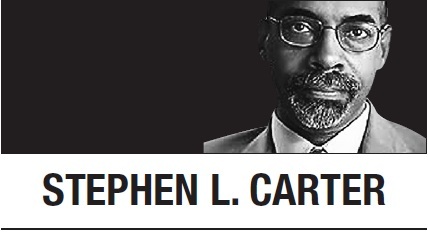[Stephen L. Carter] North Korea vs. US, minus hype machine
By BloombergPublished : Jan. 28, 2018 - 17:55
 With this week’s 50th anniversary of North Korea’s illegal seizure of the USS Pueblo on Jan. 23, 1968, and the capture of the crew, it’s worth taking a moment to consider how news reporting has changed over the ensuing decades. At the time, coverage in the papers and on television was sober and thoughtful. Items buried deep inside the stories would be headlines today, when informing the public is often less important than winning clicks and eyeballs.
With this week’s 50th anniversary of North Korea’s illegal seizure of the USS Pueblo on Jan. 23, 1968, and the capture of the crew, it’s worth taking a moment to consider how news reporting has changed over the ensuing decades. At the time, coverage in the papers and on television was sober and thoughtful. Items buried deep inside the stories would be headlines today, when informing the public is often less important than winning clicks and eyeballs.Consider a few examples. North Korean patrol boats intercepted the Pueblo about 10 p.m. Washington time. By 11:45, the ship reported that it was being boarded. At 12:32 a.m., the Pueblo’s radio went off the air. But Walt Rostow, the White House national security adviser, did not reach his office until 1 a.m. He waited a full hour before waking President Lyndon Johnson to tell him what had happened. Rostow’s decision to gather all the facts before informing the commander in chief hardly made the papers. These days, the delay might have been the lead, and cable commentators would have been frothing.
Here’s another example: At the height of the Cold War, the Soviet Union operated a worldwide fleet of fishing trawlers, with a smattering of intelligence-gathering ships hidden in the mix. Probably with the contrivance of the Johnson administration, US allies in Latin America began seizing the trawlers. The evident goal was to pressure the USSR to persuade the North Korean regime to release the Pueblo. At the time, the attitude of journalists was ho-hum. Today, the headline would have been about how risky and warmongering the tactic was.
Then there was the administration’s plan, reported by the New York Times, to make use of a pair of large fish processing ships then being built for North Korea in Rotterdam. One idea was to seize the ships, in effect playing tit-for-tat. Another was to have them shadowed by US warships all the way home, with the implicit threat that they might be attacked or even destroyed at any moment, giving the North Korean regime a month or so of travel time to think. This suggestion was buried deep on the jump page of a Times story about the incident. Many of today’s commentators would be busily denouncing the administration’s departure from diplomatic norms.
And then of course there was the predictably fierce war of words between the two countries, culminating in the pronouncement by North Korean dictator Kim Il-sung that war was imminent. For the most part the parry and thrust was reported by the news media more in sorrow than in anger. Certainly nobody argued that US rhetoric heightened the risk of armed confrontation.
In retrospect, the relative restraint with which the news media treated the crisis probably helped the administration to resolve it without bloodshed, even though negotiations for release of the crew dragged on for 11 months. True, there were understandable efforts to exploit the situation. When nominated for president by the Republican convention in Miami Beach that year, Richard Nixon used his acceptance speech to play the event as part of the Democrats-are-too-soft theme that endures in some quarters to this day:
When respect for the United States of America falls so low that a fourth-rate military power, like North Korea, will seize an American naval vessel on the high seas, it is time for new leadership to restore respect for the United States of America.
But that was politics, and to be expected, and to some extent fair game. The difference was that only a handful of papers, led perhaps by the Chicago Tribune, actually sought to stoke the anger.
Yes, the Pueblo incident was a disaster for US foreign policy. Yes, it probably contributed to Nixon’s victory in the fall, although, to be sure, his campaign theme was supported by the Soviet invasion of Czechoslovakia, the urban uprisings following the assassination of the Martin Luther King Jr., and the “police riot” at the Democratic convention in Chicago. But the journalists of the day played a mostly admirable role, reporting the news only as news and without histrionics, leaving fury and spin to the politicians.
Stephen L. Carter
Stephen L. Carter is a Bloomberg View columnist. -- Ed.
(Bloomberg)


















![[Today’s K-pop] BTS pop-up event to come to Seoul](http://res.heraldm.com/phpwas/restmb_idxmake.php?idx=642&simg=/content/image/2024/04/17/20240417050734_0.jpg&u=)